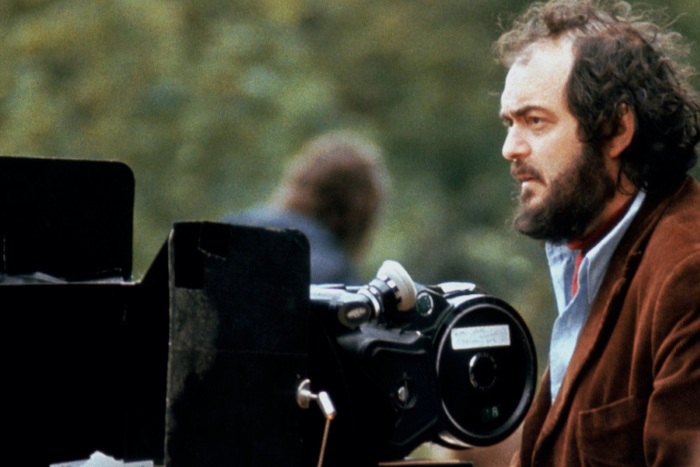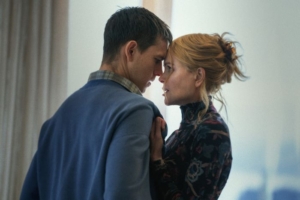When director Stanley Kubrick died on March 7, 1999—mere days after finishing what would be his final film, Eyes Wide Shut—obituaries invariably described him as a notoriously reclusive director with a Napoleon complex (unsurprisingly, Kubrick had wanted to make a film about the French dictator for decades) and that his painstaking perfectionism—dozens of retakes, reshoots, closed sets—made him a maniac with a movie camera.
Gregory Munro’s documentary Kubrick by Kubrick happily makes a dent in that well-worn narrative, if only by allowing Kubrick the opportunity to speak for himself. French film critic Michel Ciment conducted a series of interviews with Kubrick over a 15-year span, speaking with the director about A Clockwork Orange (1971), Barry Lyndon (1975), The Shining (1980), and Full Metal Jacket (1987). The recordings of those interviews form the basis of Munro’s film and what might be described as Kubrick’s first audio commentary.
When Kubrick died, DVDs were in its infancy, and he was famously opposed to any kind of explanations for his films. There were originally no making-of featurettes, deleted scenes, interviews, nor commentaries found on many Kubrick DVD titles. So, hearing Kubrick discuss matters of technique and subject matter in that inimitable Bronx accent of his—he lived the last 40 years of his life in Britain but never lost his New Yorker’s voice—will delight any film fan.
For someone who holds such a lofty perch in the minds of aficionados, Kubrick can be disarmingly straightforward and unpretentious while speaking about his own work. When talking about adapting novels that run the gamut from Paths of Glory to The Short-Timers (which became Full Metal Jacket), Kubrick insists to Ciment that discovering a great story he can tell onscreen is what he calls “a miracle.” And for someone who has a reputation as a control freak—that his films are organized within an inch of their lives, which, his detractors say, squeezes the life and humanity out of them—Kubrick disarmingly divulges that he walks onto the set without any preset plan or storyboards a la Hitchcock. He looks for the happy accident of improvisation or the sudden hit of inspiration. For instance, he confesses that he had no idea how, in one of 2001: A Space Odyssey’s pivotal sequences, HAL 9000, the malevolent computer that runs the spaceship, would figure out how the two astronauts were going to usurp his authority. Sweating bullets on the set, Kubrick suddenly realized HAL could read their lips.
Since Kubrick was also, infamously, a recluse. The director and interviewer discuss why he rarely went on location to shoot—the filmmaker supposedly rarely left his house in the English countryside except when he was shooting a film nearby. With the exception of Barry Lyndon, partly shot in Ireland, his later films were made either in London studios or, famously in the case of Full Metal Jacket, at an abandoned London gasworks that stood in, amazingly but credibly, for the Vietnamese city of Hue.
Although Ciment last spoke to Kubrick in 1987, when Full Metal Jacket was released, the director sounds like he could have been chatting about 2023 when they turn to A Clockwork Orange, which dramatized a broken-down society in which violent hoodlums roam the streets at will as private citizens cower in their homes. Kubrick pulled the film from circulation in England after violent incidents occurred that may have been inspired by the violence depicted in it. Accompanying grainy archival footage of protesters being beaten by police, Kubrick presciently ponders on how there may never be a satisfactory solution between those who are want fast societal change—especially, he says, young people—and staid government bureaucracy that opposes meaningful reforms, especially in a world filled with criminals and terrorists.
Munro also includes soundbites of actors who worked with Kubrick: Sterling Hayden, Jack Nicholson, Shelley Duvall, Tom Cruise, Nicole Kidman, and an especially insightful Malcolm McDowell, along with a pointed comment by Kubrick’s widow, Christiane. She says her husband was nowhere near the autodidact or dictator obits painted him as.
Nevertheless, the focus of Kubrick by Kubrick remains on Kubrick’s insights into his films. Still, at only 73 minutes, it leaves one wanting to hear more. There have to be many hours of recorded interviews that weren’t used, so could there be a Kubrick by Kubrick 2 in the future?

















Leave A Comment